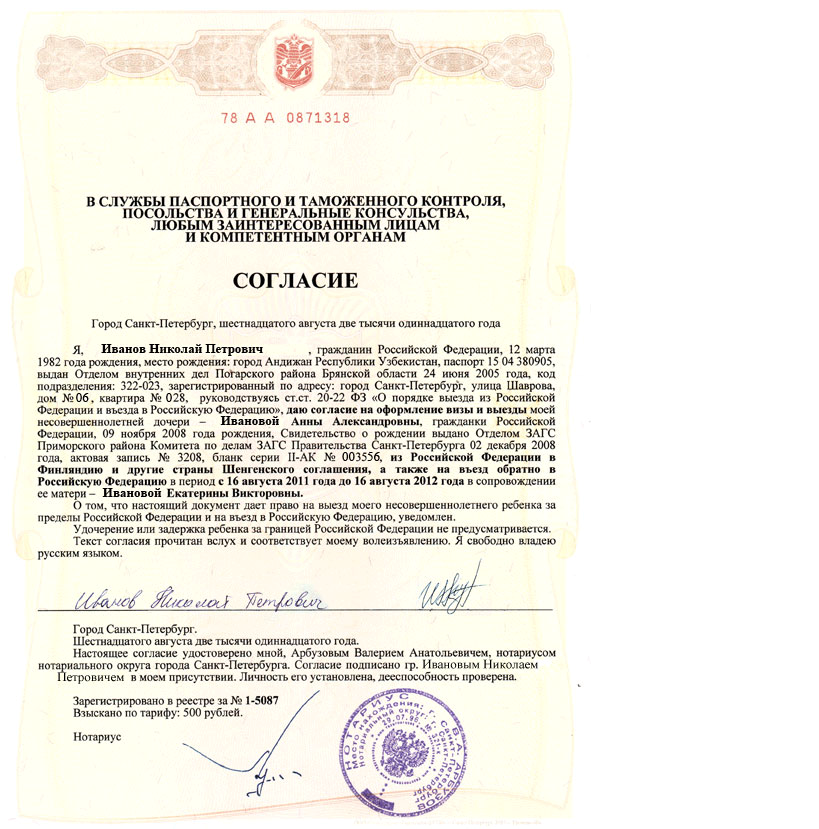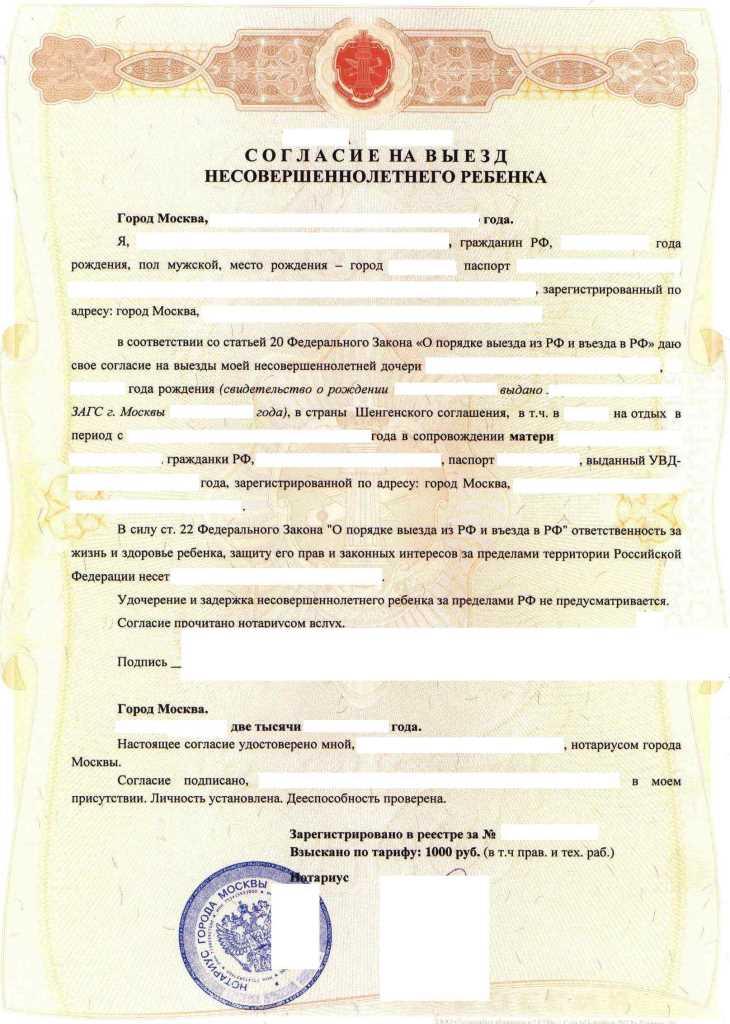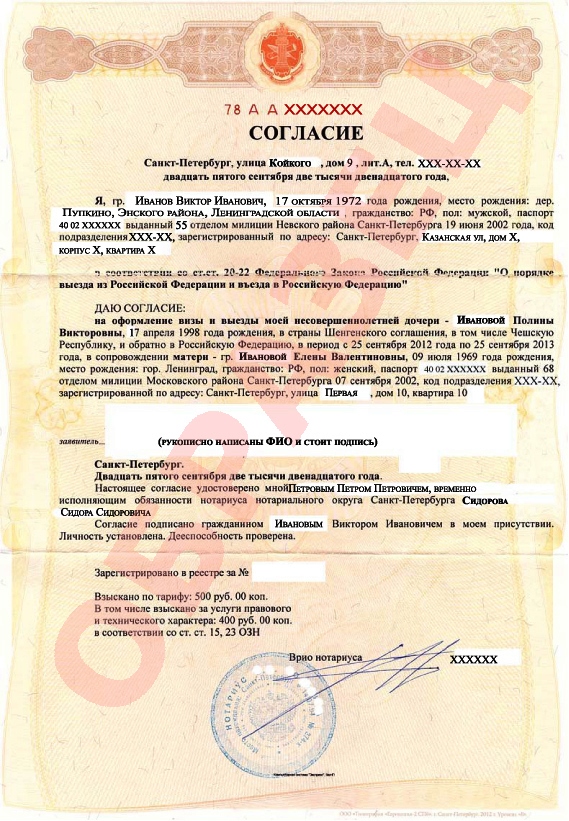Consent to the departure of an unaccompanied minor child. Consent for a child to travel abroad
The procedure for a minor to travel abroad temporarily is regulated by Chapter 3 114 of the Law. dated August 15, 1996. But many Russians cannot understand why and in what cases there should be permission for a child to travel abroad in 2017.
Before you begin to consider the issue, you need to define the following concepts:
- The legal representative is one of the parents or a trustee (guardian).
- A child is a citizen under 18 years of age.
- Temporary departure – which is not related to permanent residence.
Implementation of temporary departure under the supervision of a legal representative
According to Art. 20 of Law 14, the accompanying person is not required to obtain consent from anyone. Moreover, the border service in letter No. 21/1/7/3 dated June 27, 2007 stated that when a minor leaves the country with one of the parents, the consent of the other is not required. But parents who do not have the same last name as the heir and guardians should be aware that they may be required to provide evidence of connection with the child. This applies to Russia; in another country the rules may differ:

The USA, Switzerland, Croatia, Canada, and Great Britain require such consent. Some countries require that the document be translated into 1 or several languages at once; an Apostille stamp or certification of the translation by a notary may also be required.
Other options
Article 20 of the Federal Law does not provide for restrictions on the ability of a young traveler to travel independently. It is stated that he is "generally" under the care of his mother and father. Children, starting from the age of 16, can travel or fly on their own. To cross the Russian border they need to have:
- Foreign passport;
- Consent (notarized). The paper must indicate the duration of the trip and the state (one or more) that he can visit.
To cross the border, you must prepare in advance a notarized consent for the departure of the legal representative, which will indicate the full name, identification information, and date of birth of the accompanying person.
Consent for a child to leave sample
Consent for a child to leave without parents: sample
Ban - in what cases is it possible?
A minor's trip abroad may be complicated by the actions of one of the parents. Government Decree 273 of May 12, 2003 established that a ban may be imposed on a child traveling abroad with any parent who does not have the status of a deprived parent. right This is easy to do - submit a formal application to the FMS. The parent is not obliged to inform either his child or his ex-spouse about the existence of the prohibition. A person who is interested in crossing the border can check whether there is a ban before traveling by going to the Border website. FSB service, there is a special form there.

If the ban is unmotivated, then in this case it is possible to obtain permission for the child to travel abroad through the court. You need to know that the ban is permanent, and the court decision is one-time. If trips are regular, then there may be a radical solution to the problem:
- If travel is prohibited without justification, then parental rights may be limited.
- If the grounds are serious (aggression towards the other parent and child, failure to pay child support on an ongoing basis, alcoholism), then parental rights can be deprived.
Video:
Louis Tomlinson - Back to You (Official Video) ft. Bebe Rexha, Digital Farm Animals
 Traveling abroad of a minor child without parents - draw up a power of attorney and consent
Traveling abroad of a minor child without parents - draw up a power of attorney and consent
Traveling a child abroad requires advance and strict compliance with all necessary formalities.
Consent to the departure of a child under 18 years of age is required in cases where he or she crosses the borders of Russia accompanied by one of the parents or other legal representatives, relatives or strangers, if independent trips. The procedure for preparing this document is regulated by Art. 20-23 of Federal Law No. 114 “On the procedure for leaving the Russian Federation and entering the Russian Federation.” In accordance with the law, the departure of a child from Russia with one of the parents does not require consent.But it is necessary to take into account the fact that this document may be required upon entry into the destination country. Therefore, before traveling, it is imperative to familiarize yourself with the peculiarities of the legislation of a foreign state. This information can be obtained by calling the consulate of the country of planned stay.
DOCUMENTS REQUIRED FOR NOTARIAL CERTIFICATION OF CONSENT TO A MINOR CHILD'S TRAVEL OUTSIDE THE RUSSIAN FEDERATION:
To obtain consent for the departure of a minor child through a notary, you must:
1. Personal presence of parents (guardians, trustees) with their personal internal passport citizen Russian Federation. (Please note, not a Foreign passport, but an internal passport).
2.Original birth certificate of the minor. (Original only).
3. Provide our employees with the exact timing of the trip, and the name of the country(ies) to which the child is traveling, as well as the date of return to the Russian Federation.
4. Details of the person with whom the child is traveling.
The consent for the departure of a minor must indicate:
1. State(s) to which the minor is traveling.
2. Exact dates of departure and return to the Russian Federation.
If a child travels to the Schengen countries, this must be reflected in the Consent.
If a minor travels accompanied by one of the parents, then the consent is issued by the second parent.
If one of the parents is deceased, you must provide a Death Certificate for the parent.
Terms specified in the consent
The validity period of the Consent to Exit is not defined in the Law, so theoretically it can be issued for the period until the child reaches adulthood. However, the terms of notarial documents are generally valid for three years. In addition, the consulates of many countries require “fresh” consent with specific deadlines. Therefore, this issue must also be clarified with consulates or other authorized bodies where this document will be presented. For example, according to Article 186 of the Civil Code of the Russian Federation, the validity period of a power of attorney cannot exceed three years. But in the case of consent, this article will not apply, since consent is a different type of document. However, making consent for a long period, for example 3 years, is still possible and will be completely legal. You can also give consent before the child reaches adulthood. It is only in relation to its use that problems may arise. We still do not recommend making such long terms, in order to avoid difficulties with border service. It is best to agree to a specific trip.
Parental consent for a child to travel as part of a tourist group
During an organized departure of groups of minor citizens of the Russian Federation unaccompanied by parents, adoptive parents, guardians or trustees, the responsibilities of the legal representatives of minors are borne by the leaders of the traveling groups. If a child travels unaccompanied by parents (adoptive parents, guardians or trustees), then Consent is issued from both parents (adoptive parent, guardian or trustee).
What to do if there is no other parent?
Consent to the child’s departure from the country is not required if the minor crosses the border accompanied by his mother (father) or other legal representative and there is a court decision to deprive the other parent of parental rights or a Certificate of his death is provided. In difficult cases, it is necessary to apply to the court to obtain permission for the child to leave. If you are a single mother, then you do not need to obtain consent for the child to leave if you can provide a certificate from the registry office stating that information about the father was recorded only from the words of the mother, or a certificate from the police about the search for the second parent. It happens that the second parent is outside the country. In this case, he will need to contact the consulate of his country of residence, certify the necessary documents there and send them to you by mail.
One of the parents or other legal representatives may file a statement of disagreement with the child’s departure to the territorial migration authority, border control authority or embassy (consulate) of the Russian Federation (if permanent residence abroad). In this case, the parent interested in the child’s departure can solve the problem in court by filing an appropriate claim.
Have a good trip!
If you have any additional questions, please call
A minor citizen of the Russian Federation traveling abroad without adults must have a document confirming his departure with the permission and consent of his parents or persons guarding him.
The document is prepared in advance and must be certified by a notary, making sure that both parties agree on the child or children traveling abroad.
The permit must be issued legally, taking into account the following rules:

There is a general sample document. Having written according to the sample, you can save the document in in electronic format and show it to the notary. He will be able to transfer the information to the letterhead.
Before going to the notary, collect documentation package, which will include:
- Certificate confirming the birth of the child/children.
- Passport, if the child/children has one.
- Passports of applicants, which can be parents or guardians of the child/children.
Certification and writing of a document are two different services for which notaries charge different prices payment for work.
You can write a document yourself, saving this amount - from 500 to 1500 rubles. But for certification it will cost 100-500 rub.
We list the various options for permission to travel abroad for one child or several children:
1. Consent from both parents for the departure of one minor child:


2. Consent from both parents for the departure of two minor children
It is written in the same way as the first example, only one or more children are added.
3. Consent from the father to accompany the child or children by their mother


4. Consent from the mother for the child or children to be accompanied by their father

5. Consent from the parents or one parent for the child to travel accompanied by a third party

Latest articles
Latest news about pensions in Russia - increases, indexation and rules for calculating old-age pensions
The issue regarding the calculation and assignment of pension benefits in 2018 is extremely relevant. We will tell you what will change, how you can calculate your pension payment and what parameters to take into account, and also give real examples of calculating pensions.
Child support after 18 years of age, if the child is studying, disabled, etc. – how to arrange child support for adult children?
In Russia, obtaining alimony compensation for a child is possible, but not always. The parent, and the child himself, can count on help from the other parent voluntarily or judicially. Let's look at the procedure for collecting alimony benefits for adult children in Russia.
New rules for calculating child support in Russia - examples of calculating alimony for 1, 2, 3 children
In the Russian Federation, the old procedure for calculating alimony payments is in force. It is carried out in accordance with the Family Code of the Russian Federation. We’ll tell you what new things will be introduced in 2018, how alimony will be calculated, what it will depend on, and we’ll also give real-life examples of calculations in different situations and circumstances.
Find a company
Latest reviews of companies
Law company No. 1
They installed a parking barrier and I was fined 5,000 rubles, now I drove it into the ground and it won’t rise, can they fine me again?
Lawyer Nadezhda Vladimirovna Makarova
As life has shown, it is very difficult to find a good lawyer. Not only in Pushkin. In St. Petersburg itself there were many scammers, all kinds of law firms offering “free help” where we applied and where they promised: pay and everything will be all right for you. All these cool lawyers don’t know anything, don’t understand, and aren’t able to solve anything. They just steal money. And they even draw up the statement of claim so poorly that it has to be corrected during the court hearing. They spat on the money spent and found a lawyer in Pushkin itself. Thank you to Nadezhda Vladimirovna for your competent approach to our business and for your reasonable advice. Special thanks for the well-written documents. You do your duty and work honestly. I definitely recommend Nadezhda Vladimirovna!
Eclex (Eclecs)
Helped me get out of a confusing situation with buying an apartment! In the end, everything ended well, thanks to the competent lawyers of Eclex.
Eclex (Eclecs)
I have worked with the company several times already. in 2013 we opened an LLC, this year an individual entrepreneur. The lawyers are very competent, from online consultation to communication in the office. Prices for services are more than adequate (there is something to compare with). The quality of work is excellent. Thank you!
Alliance of Lawyers
I bought a car in 2014, but it turned out to be defective. The dealer refused to replace it with another one and I had to sue him. I entrusted the case to the lawyers of this company and did not regret it. The case was won, and all legal expenses were compensated. Thanks a lot!
You have planned to spend a vacation abroad with your child, or your child is going outside of Russia on an excursion or to participate in competitions... In any of these cases, parents have many questions regarding the rules and laws that govern the crossing of borders by Russian minors.
In many cases, a document may be required that certifies the consent of the parents or guardians for the child to travel abroad. We will tell you what it is, how to formalize it and who to present it to in this article.


Procedure for a child to travel abroad
When a child crosses state borders, you will need to comply with the laws of two countries at once - the one you are leaving and the one you are going to. Therefore, you should familiarize yourself in advance with the basic requirements of border control, which you will have to go through twice, upon departure and upon entry. Needless to say, all documents that may be requested for a child must be completed correctly and competently! After all, otherwise, the vacation may be disrupted, the mood will be ruined, and the family will incur significant waste.

In order to prevent the worst-case scenario from developing, you should make sure in advance that the child who is going on a trip with mom and dad, with other family members, or as part of a group of children with an adult accompanying person has all the necessary and important papers in order.
And now advice from a lawyer on consent for a child to travel abroad.
Required documents
So that employees passport services and the border guards have no questions for your child, he needs to collect documents according to the following list:
Own passport(from the age of 14, such an identity document is considered a mandatory requirement. Children younger can be entered with a similar document from one of the parents. No questions will arise if the child travels with this parent. In new biometric passports children are not included at all. You can arrange all this at the Federal Migration Service of your region or through the MFC).
Birth certificate.
Visa(if it is required for a particular trip. Find out whether a visa or visa-free regime valid in the selected country, possibly at the diplomatic mission of the state. The department’s website usually contains a detailed example of filling out documents for obtaining a visa for a child, including in English).
Notarized parental consent for the child to travel abroad (in certain cases).
Medical insurance policy(issued specifically for traveling abroad. For now it is not mandatory, but only recommended, but soon, when new rules come into force, the policy will become necessary. You can issue it at any insurance company.).
Other documents confirming the relationship, if the surnames of the child and his parents are different. In this case, we mean certificates of divorce, entry into a new marriage, certificates of change of surname.

We will not talk in detail about all the documents in this list; we will pay attention to the consent to leave. It is drawn up by a notary; the presence of both parents is required, with the exception of cases that we will discuss below. Parents will need passports valid in Russia, as well as a child’s birth certificate.

If one of the parents changed their surname after the birth of the baby (for example, the mother remarried after a divorce or decided to return to her maiden name), you will additionally need to take documents confirming the reasons for the change of surname and through which family ties with the child can be easily traced.
Consent is issued on a special form, which are available from all notaries, an example of filling out an application for consent will be provided to you first. After the parents write it in the prescribed form, the notary will have a short conversation with both and decide on issuing consent.

Remember that the notary has the right to refuse such a document if something seems suspicious to him, or if mom and dad do not provide all the necessary documents.


In what cases is the consent of the second parent required?
If entry into a state is visa-free, then the vast majority of such states usually do not require consent, however, it is better to be prepared for different developments. From my experience, I know that once during a trip we were not asked for consent, and when we went to the same country a second time, we were asked to present a document. Therefore, it is better to formalize consent just in case.

There are situations in which consent is mandatory. Firstly, we are talking about traveling to countries united by Schengen legislation. To obtain a visa, you will need to submit such a document to the diplomatic mission, and then you may be asked for it again when going through control. So, it makes sense to do the consent in duplicate. Please note that a photocopy is not valid.
Secondly, consent will be required if the child is traveling with one parent. In this case, you will need a document drawn up by a notary in the presence of both parents. If the baby travels with his mother, and she is divorced from his father, he will also have to obtain consent. It is advisable that the consent be accompanied by a certified translation of the document into English language, in case additional questions arise from border control representatives.

Consent from both parents is required in all cases when a child crosses boundaries with a relative or with an outside adult (coach, teacher, tour guide, family friend, etc.).
The exception is for children who are raised by only one parent, and in the section on the birth certificate in the section where data on the second parent is presented, there is a dash. In this case, there is no need to formalize consent; it is enough to take with you the birth certificate and its translation into English.

Very often, lately, single mothers do not agree to have a dash marked in the child’s document and, on the advice of the registry office employees, record a fictitious person as the father. In this case, you will have to go to the registry office where you received such a certificate and ask to issue a certificate of a certain type, which will indicate that the person recorded as the father does not exist in nature. If it is received, consent to leave is also not required.

There is no need to obtain consent even if one of the parents has died. It is enough to present a death certificate.
A few more situations in which you do not need to contact a notary to obtain consent:
One of the parents is missing. This must be certified by employees of the Ministry of Internal Affairs with a special certificate.
One of the parents is in prison. A certificate from the management of the correctional colony or settlement colony will be required.
One of the parents has been deprived of parental rights by a court. You will need to take a copy of the court decision.
If the child is adopted or under guardianship. The guardian will need to take with him the document on the basis of which the child is placed under guardianship. As a rule, this is a corresponding court decision and a certificate from the guardianship authorities.

Traveling without parental accompaniment
This has been happening quite often lately, as many gymnasiums and schools have become more willing to order sightseeing tours for their students, Russian children are increasingly becoming participants in international competitions, creative competitions, and so on. In this case, the child will have to cross the borders without mom and dad, however, without fail with one of the adults (accompanying).
Independent travel for children under 18 years of age is prohibited by the laws of all foreign countries without exception.

In this case, consent for the child to travel abroad is required from both parents. And even if a child goes to travel with his own grandmother or grandfather, with older adult brothers and sisters, consent from the mother and father is a mandatory document, which will certainly be asked to present upon departure and upon entry.

Often on the Internet you can find information that the consent of one of the parents is sufficient; in fact, this is not the case unless one of the above situations has developed in the family, when the consent of the second parent is not required in principle.
Registration of consent from both parents does not have to be done on different forms. You can draw up one document in which both mother and father will be entered, their identities and voluntary consent will be confirmed by a notary.

It is necessary to separately talk about the situation, when a child can still cross the border without parents, relatives and an accompanying person. This is possible if you can prove that a close relative will meet your child on the other side of the air bridge and first enter into an agreement with the airline to provide a special service. It provides that a company employee will meet your child at the airport of departure and accompany you during the flight. The powers of such an accompanying person will end when they hand over the child at the destination to the person meeting them. You cannot send a child under 5 years old this way.

Duration of consent
If a child is sent to a country that is one of the states united by Schengen legislation, consent for the departure of a minor will be issued exclusively for one trip, it will necessarily indicate the expected dates of entry and exit.
In other countries, consent can be issued for a longer period. Usually this is three years. Most Russian notaries, by the way, do not agree to issue a consent for more than three months. But there may be different options.
Before going to a notary for such a document, you should find out the rules for entering a specific country, since not all states allow you to put it in the parental consent long terms actions.

Sample power of attorney
Consent to travel is often mistakenly called a power of attorney; according to the rules for drawing up the document, this does not change. It is necessary to indicate the passport details of the parents, details of the birth certificate of a child or several children, the name of the country where the child is going, and the dates of the trip (start and end). If there is an accompanying person, then the passport details of this person. If an agreement has been concluded with an organization for support, then its name and, preferably, the personal data of the specific employee.

How much does registration cost?
The cost of notary services is always indicated in his tariffs. Usually, this is a fixed amount, the amount of which can be inquired in advance by phone. On average in Russia, parental consent for a child to travel abroad costs from 800 to 1200 rubles, depending on the region.
The price can almost double if you draw up the document not in the notary’s office, but invite him to come to you. You will have to pay separately for on-site registration.

Disagreement of the other party
Unfortunately, often one of the parents encounters misunderstanding on the part of the second spouse, most often the former, and cannot obtain from him voluntary consent for the child to travel abroad. This situation is twofold, let's look at it from different sides of the parties to the conflict.
And now about what to do if one of the parents does not give his consent to leave.
If a husband or wife does not consent to the child’s departure out of very real fears that he will not be brought back or that the child may be in danger, he has the right to impose a travel ban. To do this, just contact the Federal migration service Russia (to your territorial office) with a statement, and also write a corresponding statement to the border control authorities. No one will have to explain the reasons; no one has the right to demand that a parent divulge family secrets and set out all the “pitfalls”. It is enough to clearly indicate your categorical “no”. Both mother and father have this right.

If one of the parents cannot obtain the consent of the other for obscure reasons (“I won’t give it out of principle”), you should not give up, because you can protect your rights and the child’s rights to freedom of movement in court. To do this, you will need to file a claim and invite representatives of the guardianship authorities to participate in the process, who can confirm that the stubborn spouse is unreasonably interfering with the child’s legal right to travel. In the practice of judges, there are positive decisions that oblige the defendant to give the necessary notarial consent.

How to lift a travel ban?
If before your trip you asked the FMS or the FSB Border Service website if there was a ban on your child’s travel, and you discovered that there was such a ban, you will have to contact statement of claim to court. Servants of Themis will invite all parties to the conflict, weigh the parents’ arguments, and ask the child himself about his desire to go on a trip, if, of course, his age allows him to adequately answer the judge’s questions. If necessary, both the plaintiff and the defendant will have to invite witnesses to the court. The path is troublesome and not fast, however, today it is the only possible one.
Now let’s listen to a lawyer about how to impose and how to lift a travel ban.


